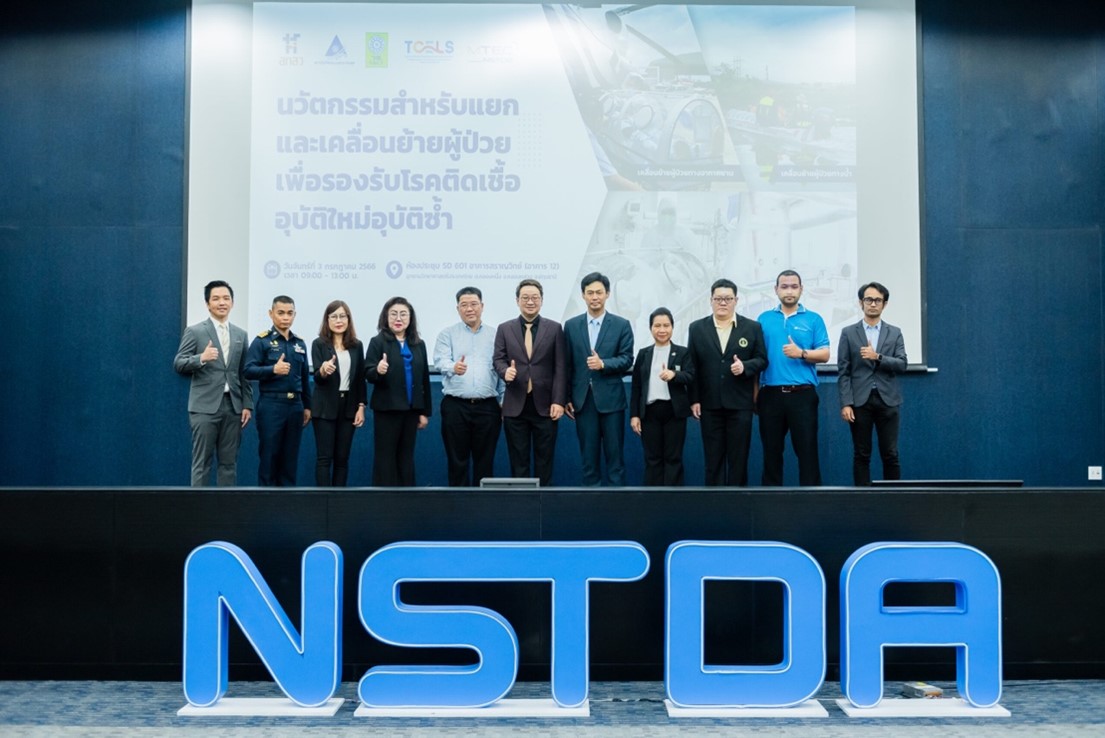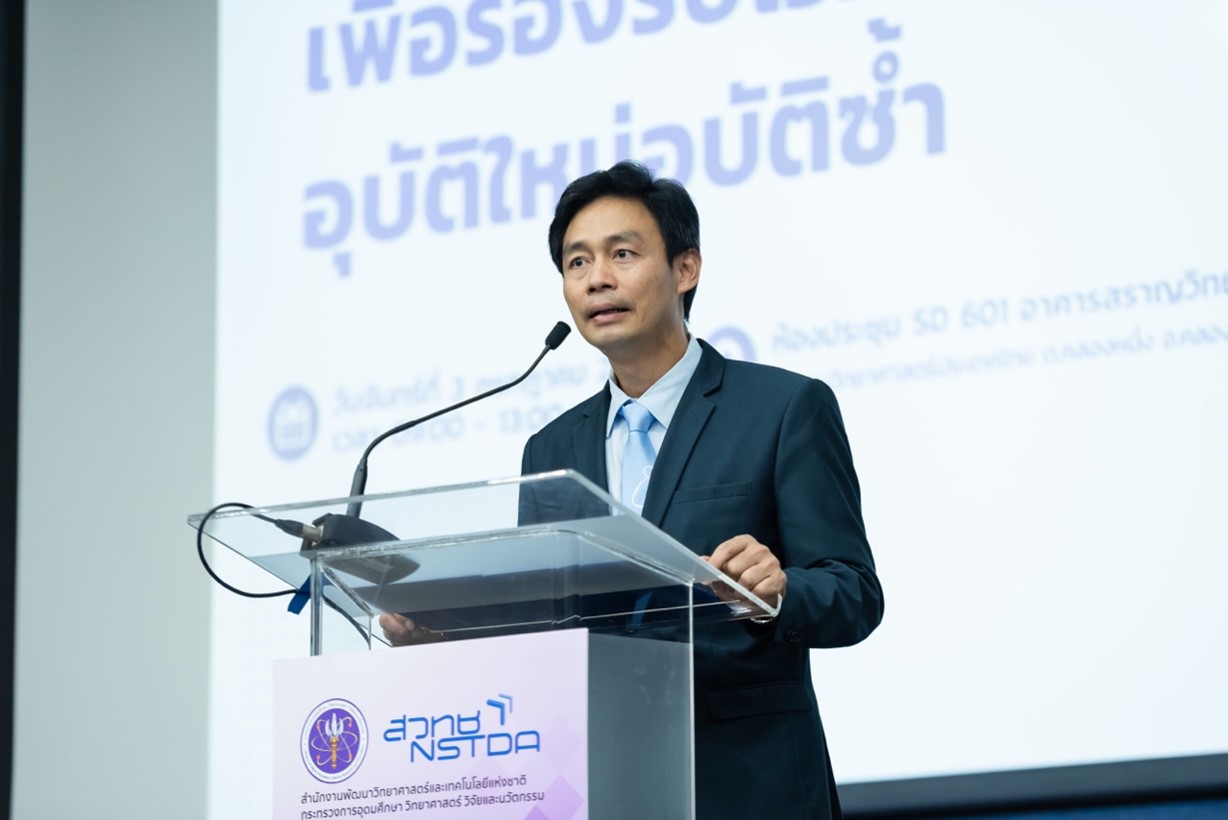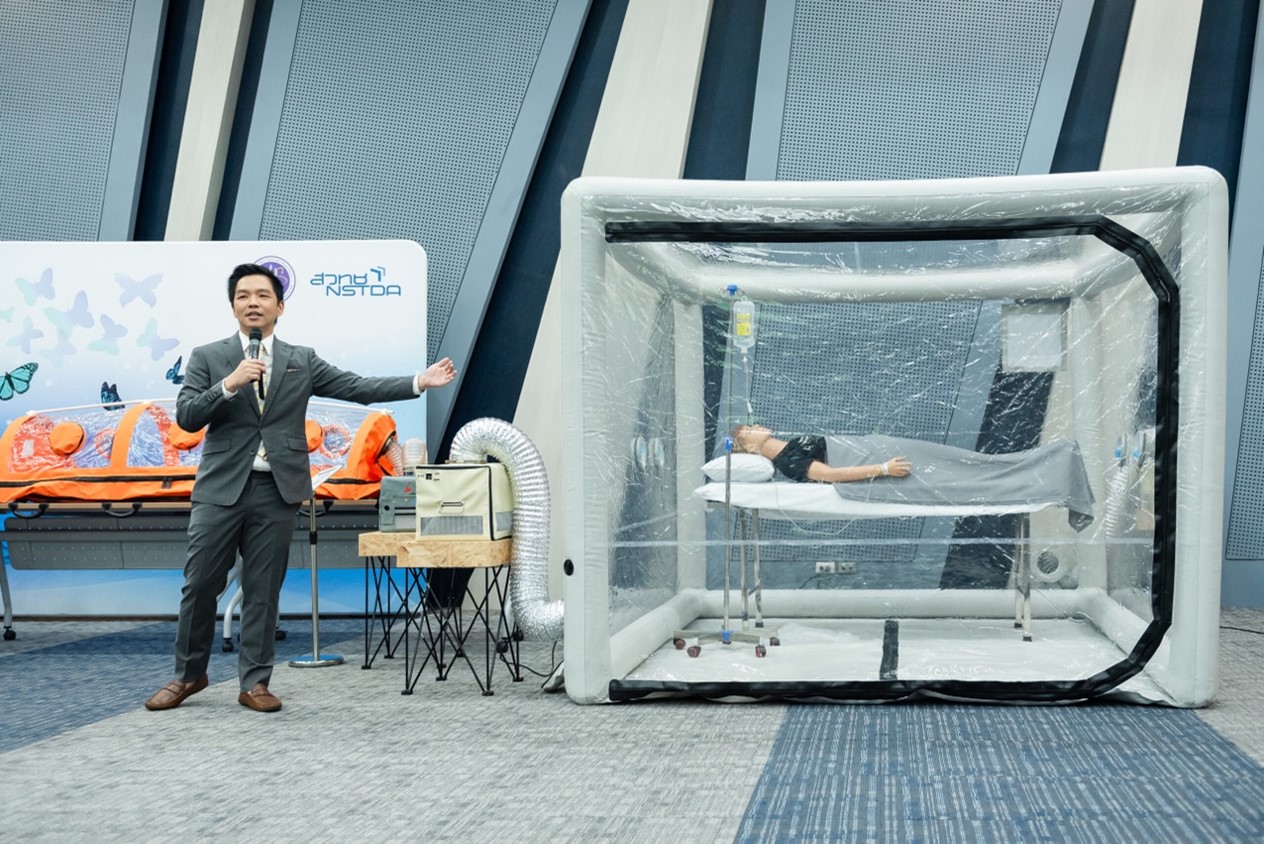MTEC-NSTDA, in collaboration with four research agencies, hosted a public seminar on innovations for patient isolation developed in response to the COVID-19 pandemic. The seminar focused on two main innovations created by MTEC: PETE (Patient Isolation and Transportation Chamber) and HI PETE (Patient Isolation Chamber for Home Isolation). The event which took place on 3 July 2023 was co-organized by Thailand Science Research Innovation (TSRI), the Health Systems Research Institute (HSRI), the National Research Council of Thailand (NRCT), and Thailand Center of Excellence for Life Sciences (TCELS).

Representatives from partner organizations present at the seminar included HSRI Executive Director Dr. Nopporn Cheanklin, NRCT Head of the National Research and Innovation Mission in Medicine and Public Health Ms. Waraporn Suchaichit, TCELS CEO Dr. Jittiporn Thammajinda, and MTEC Executive Director Dr. Julathep Kajornchaiyakul. Each speaker highlighted the role of their respective organizations in driving the development of patient isolation innovations, which not only help combat the pandemic but also enhance Thailand's public health security against emerging and reemerging diseases. These devices comply with international standards and are produced at a lower cost, 2-3 times cheaper than imported counterparts.

Dr. Julathep Kajornchaiyakul explained that the development of PETE began in February 2020 in response to the first wave of COVID-19. MTEC collaborated with medical experts from Vajira Hospital and Thammasat University Hospital to create PETE as a negative-pressure chamber for transporting infectious respiratory patients and for use in X-ray machines and CT scanners to prevent the transmission of airborne pathogens. Grants were obtained from HSRI and TSRI to test the device's performance and safety, ensuring compliance with medical device standards. The technology was then transferred to Suprera Innovation Company Limited, and the device was registered with FDA Thailand. With financial support from NRCT, Matichon Public Company Limited, and Bangkok Expressway and Metro Public Company Limited (BEM), 120 units of PETE have been manufactured and delivered to hospitals and organizations nationwide. The team is currently focused on introducing PETE to domestica and international markets with a grant obtained from TCELS.

Based on the know-how of PETE and funding from HSRI, HI PETE was developed as a negative-pressure tent to support the isolation of COVID-19 patients at home or in field hospitals. Like PETE, HI PETE has undergone extensively testing to ensure its compliance to quality and safety standards. The tent is lightweight, easy to set up, and available in various sizes to accommodate different spaces. For each HI PETE unit provided to users during the pandemic, Eastern Polymer Group supplied necessary equipment, including a bed, to make the unit functional.
Dr. Nopporn Cheanklin emphasized the importance of both isolation rooms and isolation chambers in containing airborne pathogens and preventing disease transmission which prompted HSRI to provide grants to support the development and production of PETE and HI PETE. These innovations were designed to comply with international quality and safety standards and meet the needs of medical personnel.
Dr. Nopporn further reaffirmed that the HSRI R&D funding program aims to enable the development of innovations that will benefit the public health system. These two innovations align perfectly with this objective since they can be manufactured domestically, replacing imports and helping the country overcome health crises.

Ms. Waraporn Suchaichit stated that since the emergence of COVID-19, NRCT has continuously supported research and innovation to prevent and reduce the impacts of the pandemic. The funded projects range from genetic analysis and mutation studies of the novel coronavirus in Thailand to socio-economic impact assessments and medical device development. In 2021, NRCT provided a grant to MTEC to produce PETE prototypes for sixteen organizations. An impact assessment study revealed that PETE helped save on the procurement of isolation devices, reduced transmission risks during patient transportation, and improved patient transportation efficiency.
Dr. Jittiporn Thammajinda remarked that TCELS's mission is to enhance the technological capacity and competitiveness of the health and wellness industry. Her center focuses on promoting near-market technologies such as medical supplies and advanced medical devices, positioning Thailand as a leader in medical device manufacturing in ASEAN. Currently, TCELS is funding MTEC research team to collaborate with Thai manufacturers in introducing PETE to domestic and international markets as an essential device for emergency medicine, supporting air, ground, and water patient transportation. Under this project, a clinical safety and performance study of PETE's use in emergency medicine has been conducted in collaboration with organizations such as the National Institute for Emergency Medicine, Thai Police Aviation Division, Police General Hospital, Royal Thai Police, Air Force Institute of Aviation Medicine, and Thammasat University Hospital. Data collected from the study and the user monitoring program will contribute to the product improvement process and international patent registration.

Dr. Sarawut Lerspalungsanti, Director of MTEC Engineering Design and Computation Research Group and the project lead investigator, reported that both PETE and HI PETE have undergone continuous improvement based on input and feedback from the medical community. PETE is currently at its 9th version, while the Balloon model of HI PETE showcased at the seminar is easy to set up and designed to support emergency situations. The success of these innovations can be attributed to the generous support of the medical community, funding agencies like TSRI, HSRI, NRCT, TCELS, and NSTDA, as well as public and private sectors, including Matichon, BEM, Eastern Polymer Group, and Suprera Innovation. FDA Thailand and the Electrical and Electronic Products Testing Center (PTEC) have been instrumental in ensuring that both PETE and HI PETE meet quality and safety standards, leading to their registration with FDA Thailand.

Though the pandemic is subsiding, PETE and HI PETE continue to have a significant impact as they are applicable to any airborne infectious disease, such as influenza and tuberculosis. The fact that local manufacturers can produce these medical devices at a lower cost helps reduce imports, strengthens the national health security, and prepares Thailand to deal with health crises.
